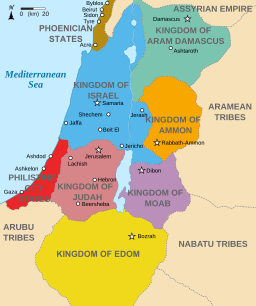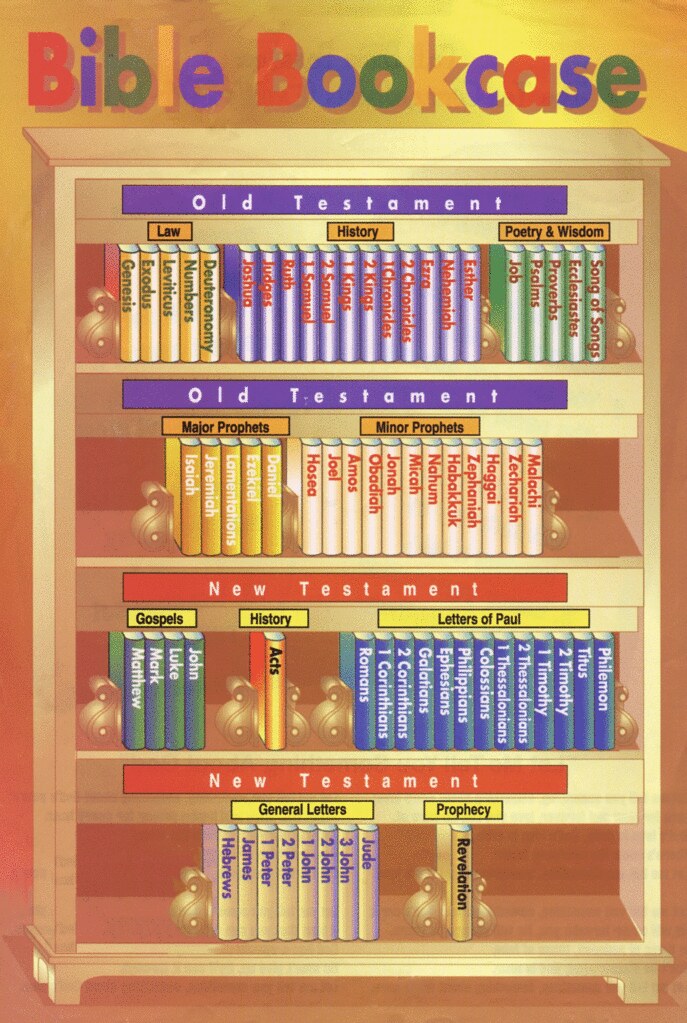 |
| Via WikiCommons. See full attribution below. |
Parallel passage: 2 Chronicles 22:5-7
BACKGROUND
Jehoram (Joram) of Israel - 2 Kings 3:1-9:25
Reigned: 852-841 BC for 12 years (brother of Ahaziah and son of Ahab)
Character: Bad mostlyOverlap with Judah's King: Jehoshaphat (873-848 B.C.) and Jehoram (853-841 B.C.)Manner of Death: Murdered by Jehu
Parallel Story: 2 Chronicles 22:5-7
He did evil in the sight of the LORD, though not like his father and mother; for he put away the sacred pillar of Baal . . . Nevertheless, he clung to the sins of Jeroboam . . . he did not depart from them" (2 Kings 3:2-3)It says here that Joram became king in the seventeenth year of Jehoshaphat, but 2 Kings 1:17 states that his son, Jehoram, was king of Judah. It was common in those days to have a son and heir to the throne become a "co-regent" with their father. See the "Kings of Israel and Judah" page.
Moab's king rebelled against Israel again (2 Kings 1:1). So, Israel's King Joram teamed up with Judah's King Jehoshaphat to attack Moab. Since Edom was under Israel's authority at the time, they also joined in the battle. In the Desert of Edom, they ran out of water. The God-seeking King Jehoshaphat asked for a prophet of the LORD. So, they went to Elisha. At first, he was standoffish. He says, "What do I have to do with you?" which probably means, "Why should I obey you?" This was probably a dig about the god Baal who was the rain god! He was saying, "Why should I obey you. Go to your rain god so you can get water." But Elisha prophesied for King Jehoshaphat's sake.
Elisha requested a harpist for the prophecy because in the Old Testament, music often came along with prophecy beginning in David's time (1 Chronicles 25:1). The prophecy promised both rain and victory, and that is what happened. They overthrew the cities and towns, cut down the trees, stopped up the springs, and ruined the fields with stones just as the LORD had commanded them.
 |
| By Neithsabes (Own work) [GFDL (www.gnu.org/copyleft/fdl.html) or CC-BY-SA-3.0-2.5-2.0-1.0 (www.creativecommons.org/licenses/by-sa/3.0)], via Wikimedia Commons |
The Moabite Stone (also called the Mesha Stele) has been discovered that contains King Mesha's record of this battle and others with "Omri" who was first in the line of Omride kings that included Ahab, Ahaziah, and Joram. From his account, he claims to have been delivered from Israel because of the god, Chemosh. Even though Israel withdrew from Kir-Hareseth because of Mesha's detestable act, the overall battle was won by the Lord!
REFLECTION
Elijah and Elisha were two very different people. Elijah was a fiery and dramatic confronter of evil. In this passage, Elisha delivered a quiet prophecy of miraculous provision and victory by harp. Elisha would spend over 50 years demonstrating God's power through caring for people.
Elisha could have tried to be just like Elijah thinking that was the way to be God's servant, but He served God the way God designed him. I had an Elijah in my life once. It was the opposite, she was a quiet and intellectual woman of God, and I thought to be a godly woman, I had to be just like her. One day, I realized that I could never be like Sheryl, and I just needed to be the woman God made me to be with my particular Gifts, Personality, and Strengths (GPS!), and let Him guide me in how He wanted me to best serve Him!
APPLICATION
Are you more like the fiery Elijah or the quieter Elisha?
Elijah and Elisha were definitely different personalities. So, if you have not taken this test, go ahead and do it:
Personality Style Inventory
PDF version (with greater delineation for each question)
16Personalities (this is since I first wrote this blog, and I like it)I have used the first one since graduate school in the 80s.
The long-form, official Myers-Briggs Test that you pay for is the most accurate.
I also want to include this wonderful lecture about introverts that would even be helpful for you extraverts to watch so that you might understand them better.
Here is a Ted Talk about introverts. (By the way, I do not necessarily like the title because the story of Elisha is about the power of GOD through an introvert!)
I also want to include this wonderful lecture about introverts that would even be helpful for you extraverts to watch so that you might understand them better.
Here is a Ted Talk about introverts. (By the way, I do not necessarily like the title because the story of Elisha is about the power of GOD through an introvert!)
PRAYERSusan Cain: The power of introverts (Ted Talk Link)
“There's zero correlation between being the best talker and having the best ideas.”— Susan Cain
Lord, work through us to display Your awesome power to an unbelieving world. We ask this in Jesus' name. Amen.
Map from: By Kingdoms_of_Israel_and_Judah_map_830.svg: *Oldtidens_Israel_&_Judea.svg: FinnWikiNo derivative work: Richardprins (talk) derivative work: Richardprins (Kingdoms_of_Israel_and_Judah_map_830.svg)
[CC-BY-SA-3.0 (www.creativecommons.org/licenses/by-sa/3.0) or GFDL (www.gnu.org/copyleft/fdl.html)], via Wikimedia Commons



